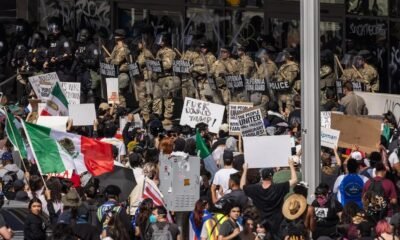border
Trump Administration Aware Most Venezuelan Deportees to Salvadoran Prison Lacked U.S. Convictions

This story highlights significant findings regarding the deportation of Venezuelan immigrants during the Trump administration. Recent investigations reveal that roughly 238 Venezuelan nationals were sent to a maximum-security prison in El Salvador, most of whom had not been convicted of crimes in the U.S.
Despite being branded as ‘terrorists’ by officials, internal data from the U.S. Department of Homeland Security indicates that only 32 had previous convictions, predominantly for nonviolent offenses. Of these, just six had committed violent crimes. Over half of the deportees faced no charges at all; instead, they were categorized only as violators of immigration laws.
Further analysis uncovered that only 20 out of the 238 had prior arrests or convictions abroad, including serious offenses like armed robbery and assault. Notably, no names from this group matched those on lists of alleged gang members maintained by Venezuelan law enforcement and Interpol.
The deportation itself drew legal ire, as the ACLU’s lead attorney termed it a clear violation of due process. The immigrants were detained under the pretext that they belonged to the Tren de Aragua gang, described as a terrorist group invading the U.S. This classification allowed for expedited removal without the usual judicial oversight.
Families of the deported expressed profound distress and disbelief. Many relatives recounted that their loved ones were unaware they would be sent to El Salvador instead of returning to Venezuela. The experiences leading to their deportation varied, with numerous detainees, such as 31-year-old soccer coach Leonardo José Colmenares Solórzano, having no criminal history.
Investigators noted that while the government claimed the immigrants were linked to a notorious gang, this assertion relied largely on tattoos and social media presence. Experts stated that such indicators are not reliable markers of gang affiliation.
Officials defended the administration’s stance, but critics assert that the narrative promoted does not align with the evidence. Many of the deported faced charges such as retail theft, traffic violations, and minor substance possession, not the serious crimes portrayed.
In conclusion, this incident raises pivotal questions about the legality and ethics of such deportations, along with the broader implications for immigrant rights and due process in the United States.

















